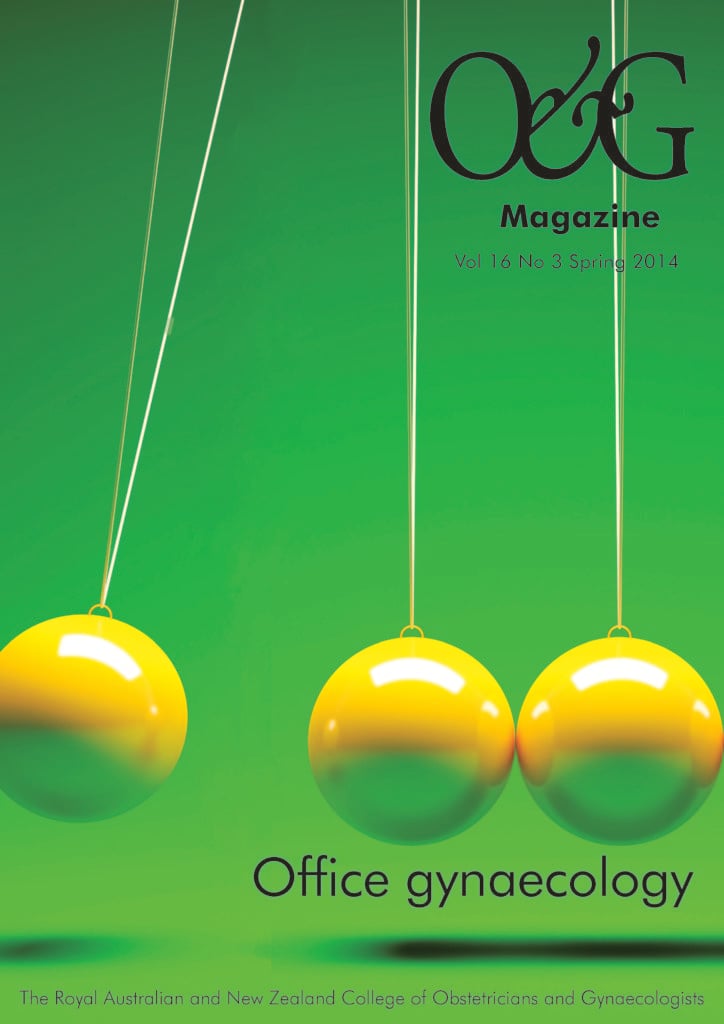Given the forthcoming joint RANZCOG/RCOG Scientific Meeting in Brisbane, in April 2015, and the Sydney ASM, in late 2013, the decision was made not to have an Annual Scientific Meeting in 2014. This has led to an increased focus on the Regional Scientific Meetings in 2014: Provincial Fellows in Port Lincoln, Queensland-NSW on the Gold Coast, WA-SA in Broome and Victoria-Tasmania in Melbourne. These are all important events in the College calendar, with high-quality scientific content and great camaraderie among attendees. Each was superbly organised by Fellows, supported by College staff, with the best national speakers giving many superb talks. I encourage you all to support your regional meetings in the future – as well as the 2015 ASM in Brisbane.
Selection for specialist training
I write this on a fine Saturday morning, receiving news from our prospective Trainees as to whether they have or have not been invited to the interview stage of College selection for specialist training. This year there were more than 250 applicants for fewer than 80 positions in Australia (New Zealand completed their parallel process earlier). So many current Fellows, not least the author of these words, would have really struggled to achieve selection under such intense competition. Disappointment merges with incredulity when an outstanding doctor misses out on his/her ambition to begin a career in obstetrics and gynaecology. So what is the process?
In essence, selection for any position in the workforce must rely on a written application accompanied by a curriculum vitae, referee reports and an interview. The curriculum vitae is scored, but relatively little differentiates prospective Trainees. Rurality, Indigenous background or a brilliant academic record identify only a few. Almost all meet the criterion related to experience in obstetrics and gynaecology. Referee reports are highly structured, but almost invariably the referees rate their prospective Trainees very highly across all areas. Challenging interview questions are developed by the selection subcommittee and are uniform across all interview panels.
Any selection process will never be perfect and the selection process of all the specialist colleges will inevitably come under increased scrutiny as the tsunami of young medical graduates seek specialist training in a competitive environment that can only be described as extreme. The College will strive to further improve its processes with the objective of being both fair and transparent – but also with the intention of trying to select the best possible future specialists in obstetrics and gynaecology.
Women’s health
Morcellation and mesh
Morcellation of fibroids and mesh for pelvic organ prolapse are two issues that have attracted much recent publicity. This is, in part, because of some adverse outcomes, but more particularly following news statements from the US Food and Drug Administration (FDA) such as: the ‘FDA discourages use of laparoscopic power morcellation for removal of uterus or uterine fibroids.’
The College clearly has a role to play in communicating accurate information to Fellows through such avenues as its website, electronic newsletter (Collegiate), journals and scientific meetings. Importantly, there is also a role for the College in limiting unfounded alarm, such as when urinary continence procedures involving tape had been inappropriately grouped in the same context as mesh procedures for pelvic organ prolapse. The College is indebted to members of the Women’s Health Committee and also to experts such as Prof Malcolm Frazer (Chair of the Urogynaecology Subspecialty Committee) and A/Prof Anusch Yazdani (Vice-President, AGES), who have greatly assisted in the development of College responses to these important issues.
National Cervical Screening Program
Members and Trainees are by now aware of the planned changes to the National Cervical Screening Program (NSCP). The Australian Medical Services Advisory Committee (MSAC) has recommended that the NCSP move to using a primary human papilloma virus (HPV) test to prevent cervical cancer.
Australia will be the second country (the Netherlands is to start in 2016) to make this decision, which is expected to further reduce incidence and mortality from cervical cancer. It is anticipated that any changes will not be implemented before 2016; however, the key recommendation is five-yearly cervical screening using a primary (HPV) test, commencing at 25 years of age with exit testing of women at 70–74 years of age. Triage of positive HPV tests will occur through partial genotyping and liquid-based cytology. Australia has the second-lowest incidence and the lowest mortality rate from cervical cancer in the world. This new screening strategy (along with HPV vaccination) is predicted to further substantially reduce mortality and morbidity from cervical cancer by at least
15 per cent.
Pastoral care
Council acknowledges the importance of the College providing appropriate and adequate support for Trainees and Fellows in difficulty, whether as a result of events in one’s personal or professional life, a College decision or other matter. There is, however, no easy solution and while the importance of colleagues and mentors cannot be overstated, the College remains open to suggestions of mechanisms that RANZCOG might establish to better provide pastoral support to its members.
Liam Davison
All at the College were devastated to learn that one of our long-standing senior staff, Liam Davison, was, together with his wife, among those lost with Malaysian Airlines flight MH17. Liam made an enormous contribution to the College over almost eight years; most recently leading the online learning portfolio and CLIMATE development. He was always very generous with his time and had a great sense of humour. He will be greatly missed. The tribute that Lyn Johnson delivered at the recent meeting of the College Council is in this issue.
Council
July 2014 saw the last meeting of the Eighth RANZCOG Council. At the time of writing, elections for the Ninth Council are in process. It is timely for me to thank outstanding contributors who are leaving Council after many years of service. Dr Tony Frumar (NSW) has served seven years on Council and numerous College committees, Prof Sue Walker (Vic) for six years, with a particularly important contribution to the Women’s Health Committee. In addition, Dr Amber Moore and A/Prof Beverley Vollenhoven have chosen not to re-nominate for Council after varying terms on Council and associated committees. Through their tireless pro bono work on College committees, these and all Councillors have made outstanding contributions to women’s health, to training and the Fellowship. The gratitude of all the College goes with them.
Elections for the Board of the Ninth RANZCOG Council were conducted at the July 2014 meeting of Council. I am delighted to welcome two new members to the Board: Dr John Tait (Vice-President) and Prof Ian Symonds (non-Office Bearer); and the return of Dr Vijay Roach (Vice-President), A/Prof Steve Robson (Vice-President), Dr Martin Ritossa (Treasurer) and Dr Sarah Tout (non-Office Bearer). I would like to most sincerely thank Dr Gino Pecoraro who leaves the Board after six years of service and whose extensive contributions to the Board and Council have been greatly appreciated
by all.






Leave a Reply